七年级英语一般将来时语法知识点讲解及练习
[语法]初中英语一般将来时讲解与练习(含答案)
![[语法]初中英语一般将来时讲解与练习(含答案)](https://img.taocdn.com/s3/m/c26c830e17fc700abb68a98271fe910ef12dae32.png)
初中英语:一般将来时专项练习题1.People in Urumqi are glad that Subway Line One by the end of the year 2017.A.will complete B.will be completedC.has completed D.is completed【答案】B【解析】【详解】句意:乌鲁木齐的人们很高兴地铁1号线将在2017年底完工。
will complete将要完成,一般将来时态;will be completed一般将来时的被动语态;has completed现在完成时;is completed一般现在时的被动语态。
根据句意可知,that从句中的主语Subway Line One与动词complete构成被动关系,应使用被动语态。
再根据句中的时间状语by the end of the year 2017可知,这里用一般将来时态,故选B。
2.The 31th Olympic Games _______ in Rio de Janeiro of Brazil in 2016. A.is held B.will holdC.will be held D.is going to hold【答案】C【解析】【详解】试题分析:句意:第31届奥运会将于2016年在巴西里约热内卢举行。
举办奥运会,The 31th Olympic Games在句中作主语,用被动语态。
2016年将要发生的动作,用一般将来时态。
故选C。
【考点定位】:考查动词时态及语态辨析。
3.Half of the work _________ in two days.A.will finish B.will be finished C.have beenfinished D.has been finished【答案】B【解析】【详解】句意:这项工作的一半将在两天后完成。
考查被动语态。
一般将来时(讲义及答案)
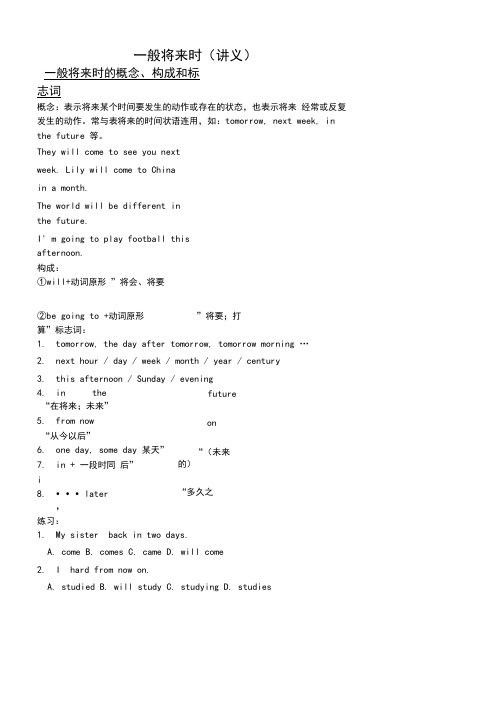
一般将来时(讲义)一般将来时的概念、构成和标志词概念:表示将来某个时间要发生的动作或存在的状态,也表示将来 经常或反复发生的动作。
常与表将来的时间状语连用,如:tomorrow, next week, inthe future 等。
They will come to see you nextweek. Lily will come to Chinain a month.The world will be different inthe future.I' m going to play football thisafternoon.构成:①will+动词原形 ”将会、将要②be going to +动词原形 ”将要;打算”标志词:1. tomorrow, the day after tomorrow, tomorrow morning…2. next hour / day / week / month / year / century3. this afternoon / Sunday / evening4. in the “在将来;未来”5. from now “从今以后”6. one day, some day 某天”7. in + 一段时同 后” i8. •••later ,练习:1. My sister back in two days.A. comeB. comesC. cameD. will come2. I hard from now on.A. studiedB. will studyC. studyingD. studies futureon“(未来的)“多久之3.后天Tcm将要离开北京-(翻径)_____________________4.中国将会变得更强大,(翻修)______________________5.They will visit Zhengzhou next month.(写出同义句)6.When will you leave for China (写出同义句)When you句式变换She will be angry with him.否定句:She will not be angry with him. /She won, t be angry with him. 一般疑问句:Will she be angry with him 回答:Yes, she will. / No, shewon , t.特殊疑问句:Who will she beangry with注意:will可缩写为'11, will not可缩写为won' t /wa u nt/练习:1.这个周末他不会去钓鱼。
一般将来时态知识点详解(初中英语专项复习) (4)
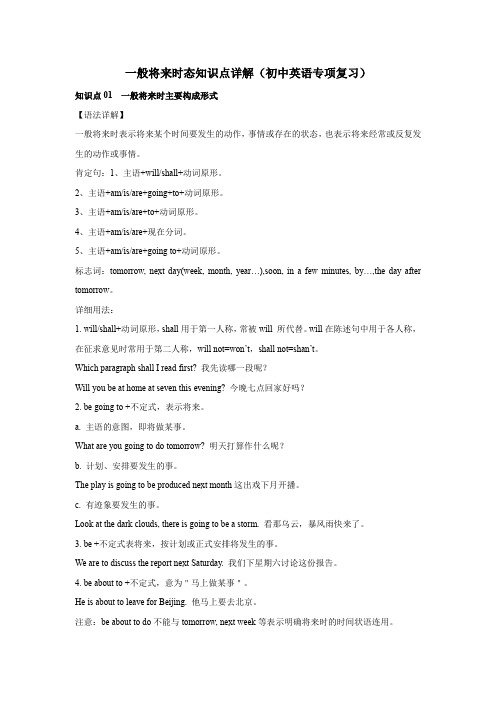
一般将来时态知识点详解(初中英语专项复习)知识点01 一般将来时主要构成形式【语法详解】一般将来时表示将来某个时间要发生的动作,事情或存在的状态,也表示将来经常或反复发生的动作或事情。
肯定句:1、主语+will/shall+动词原形。
2、主语+am/is/are+going+to+动词原形。
3、主语+am/is/are+to+动词原形。
4、主语+am/is/are+现在分词。
5、主语+am/is/are+going to+动词原形。
标志词:tomorrow, next day(week, month, year…),soon, in a few minutes, by…,the day after tomorrow。
详细用法:1. will/shall+动词原形,shall用于第一人称,常被will 所代替。
will在陈述句中用于各人称,在征求意见时常用于第二人称,will not=won’t,shall not=shan’t。
Which paragraph shall I read first? 我先读哪一段呢?Will you be at home at seven this evening? 今晚七点回家好吗?2. be going to +不定式,表示将来。
a. 主语的意图,即将做某事。
What are you going to do tomorrow? 明天打算作什么呢?b. 计划、安排要发生的事。
The play is going to be produced next month这出戏下月开播。
c. 有迹象要发生的事。
Look at the dark clouds, there is going to be a storm. 看那乌云,暴风雨快来了。
3. be +不定式表将来,按计划或正式安排将发生的事。
We are to discuss the report next Saturday. 我们下星期六讨论这份报告。
初中英语主要时态系列——一般将来时讲解及练习【附中考真题及解析】
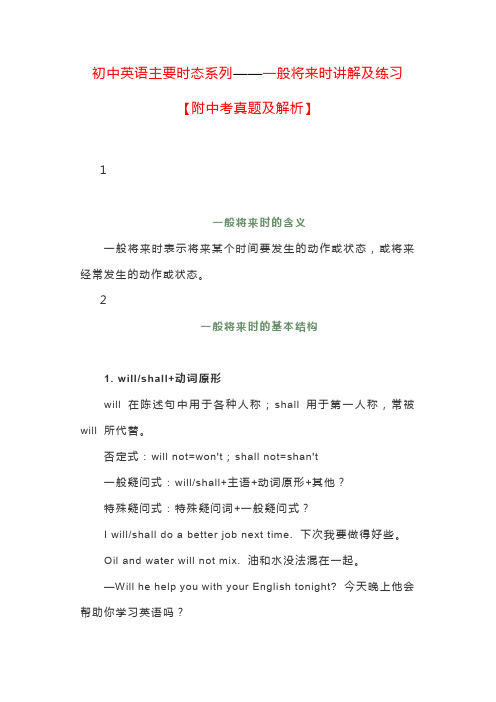
初中英语主要时态系列——一般将来时讲解及练习【附中考真题及解析】1一般将来时的含义一般将来时表示将来某个时间要发生的动作或状态,或将来经常发生的动作或状态。
2一般将来时的基本结构1. will/shall+动词原形will 在陈述句中用于各种人称;shall用于第一人称,常被will 所代替。
否定式:will not=won't;shall not=shan't一般疑问式:will/shall+主语+动词原形+其他?特殊疑问式:特殊疑问词+一般疑问式?I will/shall do a better job next time. 下次我要做得好些。
Oil and water will not mix. 油和水没法混在一起。
—Will he help you with your English tonight? 今天晚上他会帮助你学习英语吗?—Yes, he will./No, he won't. 是的,他会。
/不,他不会。
—When will you arrive for America? 你什么时候去美国?—Tomorrow. 明天。
2. am/is/are going to +动词原形否定式:am/is/are not going to +动词原形一般疑问式:am/is/are +主语+ going to + 动词原形+其他?特殊疑问式:特殊疑问词+一般疑问式?He is going to spend his holidays in London. 他打算在伦敦度假。
Look at the dark clouds. There is going to be a storm. 看那乌云,快要下雨了。
Is he going to collect any data for us? 他会帮我们收集数据吗?What are you going to do tomorrow? 明天你打算作什么?3一般将来时的用法will+动词原形与am/is/are going to +动词原形的用法虽然都表示将来发生动作或情况,一般情况下能互换。
【语法】初中英语一般将来时讲解与练习(含答案)50题

初中英语:一般将来时专项练习题1.Teenagers _________ to look after themselves from a young age. A.should educate B.should be educated C.shouldn’t be educated D.not should educate【答案】B【解析】【详解】句意:青少年应该接受教育,从小就照顾自己。
考查被动语态。
should应该,后接原形动词;本句主语teenagers青少年,是动词educate 的受动者,需用被动语态,可排除AD选项。
根据句意语境,可知本句是肯定意义,故选B。
2.-The Big Parade(大阅兵) in Russia has made a big hit in the world and another one on September 3rd, 2015,in China.-Yes, I can't wait to meet the excitement.A.was held B.is heldC.has been held D.will be held【答案】D【解析】【详解】试题分析:句意:——俄国的大阅兵在世界上取得了很大成功,并且又一次大阅兵将在2015年九月三日在中国举行。
——我迫不及待地要满足兴奋。
根据语意句子用一般将来时的被动语态,故答案选D。
考点:考查时态和语态。
3.--- A new shopping mall ______ next year in our town.--- Really? It is wonderful! I needn’t go far away to buy things.A.is built B.has built C.will build D.will be built 【答案】D【解析】【详解】句意:——一家新的购物商场将于明年建在我们的家乡。
(英语)初中英语重点一般将来时讲解与练习(含答案)

初中英语:一般将来时专项练习题1.What good news! Xiaogan West Station in Yunmeng in two years. A.buildsB.will buildC.is builtD.will be built【答案】D【解析】【详解】句意:多好的消息啊!孝感西站将于两年内在云梦建成。
A. builds 动词三单,建造;B. will build一般将来时态,将要建造;C. is built 一般现在时态的被动语态,被建造;D. will be built一般将来时态的被动语态,将被建造。
根据in two years表示将来的时间短语,以及主谓之间的被动关系,所以本句使用“一般将来时态的被动语态”。
故选D。
2. A Disneyland Park ________ in Shanghai Pudong New Area in the near future.A.has been built B.will built C.will be built【答案】C【解析】【详解】试题分析:句意:不久的将来,在上海浦东新区要建迪士尼乐园。
当主语是动作的承受者时,用被动语态。
结合句意,故选C考点:考查被动语态的用法。
3.—I’m wondering if I have passed the interview.— Please wait patiently. You at once if there is any news.A.will contact B.are contacting C.are contacted D.will be contacted【答案】D【解析】【详解】句意:——我想知道我是否通过了面试。
——请耐心等待。
如果有任何消息,我们会立即与您联系。
A. will contact一般将来时;B. are contacting现在进行时;C. are contacted一般现在时的被动语态D. will be contacted一般将来时的被动语态。
初一英语一般将来时练习题及答案参考

这篇关于初⼀英语⼀般将来时练习题及答案参考,是特地为⼤家整理的,希望对⼤家有所帮助!知识点⼀、⼀般将来时表⽰将要发⽣的动作或存在的状态及打算、计划或准备做某事。
⼀般将来时由助动词shall或will加动词原型构成,shall⽤于第⼀⼈称,will⽤于第⼆、三⼈称。
⼆.时间状语:tomorrow, next day(week, month, year…),soon, in a few minutes, by…,the day after tomorrow, etc.三.基本结构:1、肯定句主语+am/is/are+going to + do;will/shall + do.2.否定形式:am/is/are not going to do ;will/shall not do。
3.⼀般疑问句:be放于句⾸;will/shall提到句⾸。
例句:They are going to have a competition with us in studies.他们将有⼀场⽐赛和我们⼀起研究。
It is going to rain.天要下⾬了。
四、注意1、在时间或条件状语从句中,⼀般不能⽤将来时态,⽽⽤现在时态代替:they’ll fight till they win complete victory.i’ll be round to see you if i have time tomorrow.2、表⽰将要发⽣的动作或情况,除了⼀般将来时外,还有⼀些其他结构和时态:①. be going +不定式(表打算、准备作的事或即将发⽣或肯定要发⽣的事):we ‘re going to put up a building here.how are you going to spend your holiday?who is going to speak first?②. be +不定式(表⽰按计划安排要发⽣的事或⽤来征求对⽅的意见):when is the factory to go into production?the line is (going) to be opened to traffic next week.am i to (=shall i ) go on with the work?③.⼀般现在时(限于某些动词,表⽰按计划或时刻要发⽣的事):school finishes on january 18th.we get off at the next stop.when does the winter vacation begin?④.现在进⾏时(限于某些动词,表⽰按计划安排要发⽣的事):we are having an english evening tonight.they are playing some folk music next.i am talking the children to the zoo (on sunday ).3、在表⽰打算或准备时,如不提时间、条件等,多⽤be going to这个结构,⽤⼀般将来时时很少的,特别是在⼝语中:he is going to buy a dictionary.(很少说he will buy a dictionary.)在谈即将发⽣的情况时,⽤be going to 这个结构也多⼀些。
初中英语一般将来时讲解与练习(含答案)

一般将来时讲解与练习一、概念:一般将来时表示将来某个时间要发生的动作或存在的状态,及计划、打算或准备做某事。
常常与表示将来的时间状语连用。
如:tomorrow,next day(week, month, year…),soon,the day after tomorrow(后天)等。
二、常用的表达形式共有五种,现归纳如下:(一)“will +动词原形”这一形式,主要用于在以下几个方面:1、表示单纯的未来“将要”通用于各个人称。
eg:They will go to visit the factory tomorrow. 明天他们将去工厂参观。
I’ll come with Wang Bing and Yang Ling. 我将和王兵、杨玲一起来。
The rain will stop soon. 雨很快就要停了。
2、表示不以人的意志为转移的自然发展的未来的事。
eg:Today is Saturday. Tomorrow will be Sunday. 今天是星期六。
明天是(将)是星期日。
He will be thirty years old this time next year. 明年这个时候他就(将)三十岁。
3、问对方是否愿意做某事或表示客气地邀请或命令。
eg: Will you please turn on the radio? 请打开收音机好吗?Will you go to the zoo with me? 你和我一起去动物园好吗?Shall we go there at five? 我们五点钟去那儿,好吗?Will you please open the door? 请你把门打开,好吗?注:在口语中will用于所有人称,书面语中第一人称常用shall。
(二)“be going to+动词原形”的形式,表示事先经过考虑、安排好打算、计划要做的事情以及已有迹象表明必将发生某事,意为“打算;就要”。
一般将来时讲解(附习题+答案)

一般将来时讲解(附习题+答案)一、一般将来时的含义:表示动作发生在将来二、一般将来时的句型:(1) will/shall+动词原形(2) be going to+动词原形三、一般将来时的时间状语:tomorrow(明天)、the day after tomorrow(后天)、next...(下一...): next week(下一周)、next year(明年)、next month(下个月)in+一段时间(...之后): in three days(三天之后)、in the future在未来this evening(今天晚上)四、一般将来时的句型结构:(1) will/shall+动词原形(will not =won’t)(will 各种人称均可用,shall 只能用于第一人称)1)肯定句:主语+will/shall+动词原型...如:I will go to school tomorrow.我明天将会去学校He will go to school tomorrow.他明天将会去学校。
2)否定句:主语+will/shall+not+动词原型...如:I won’t go to school tomorrow.我明天将不会去学校。
He won’t go to school tomorrow.他明天将不会去学校。
3)一般疑问句:Will/Shall +主语+动词原型...如:Will you go to school tomorrow?你明天要去学校吗?Will he go to school tomorrow?他明天要去学校吗?肯定回答:Yes, 主语+will.如:Yes, I will.Yes, he will.否定回答:No,主语+will+not.如:No, I won’t.No, he won’t.4) 特殊疑问句:特殊疑问词+will/shall+主语+动词原型...如:What will you do tomorrow?你明天将会做什么?What will he do tomorrow?他明天将会做什么?(2) be going to+动词原形1)肯定句:主语+be going to +动词原型...如:I am going to buy some books tomorrow.我明天打算去买一些书。
初中一般将来时讲义【含答案】
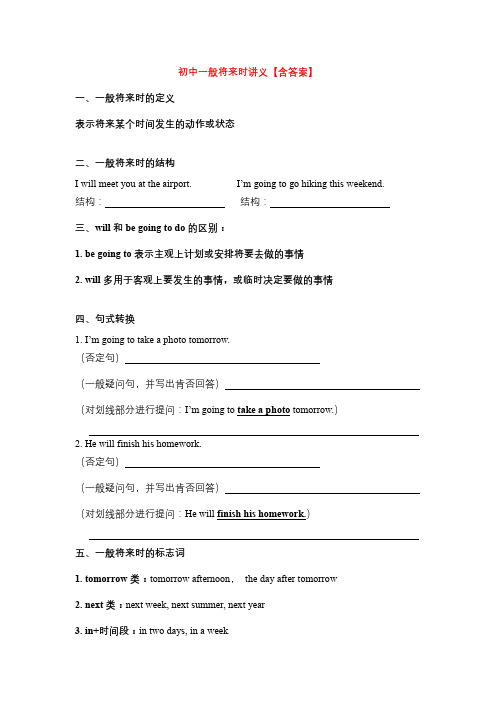
初中一般将来时讲义【含答案】一、一般将来时的定义表示将来某个时间发生的动作或状态二、一般将来时的结构I will meet you at the airport. I’m going to go hiking this weekend.结构:结构:三、will和be going to do的区别:1. be going to表示主观上计划或安排将要去做的事情2. will多用于客观上要发生的事情,或临时决定要做的事情四、句式转换1. I’m going to take a photo tomorrow.(否定句)(一般疑问句,并写出肯否回答)(对划线部分进行提问:I’m going to take a photo tomorrow.)2. He will finish his homework.(否定句)(一般疑问句,并写出肯否回答)(对划线部分进行提问:He will finish his homework.)五、一般将来时的标志词1. tomorrow类:tomorrow afternoon,the day after tomorrow2. next类:next week, next summer, next year3. in+时间段:in two days, in a week4.其他:in the future, one day, someday【课堂练习】1. We don’t know when __________ next week. Please call me when he arrives.A. will he arriveB. does he arriveC. he will arriveD. he arrives2. —How soon will he come back to Guangzhou?—I have no idea. Maybe he __________ in one or two days.A. will comeB. comesC. comeD. came3. ---will the train arrive?---It the station in 50 minutes.A. How soon; will get toB. How soon; arriveC. How long; will reachD. How far; gets to4. Will you at the bus stop at 10:30?A. meetingB. meetsC. meetD. met5. Lily and I to the concert it we free next week.A. go; areB. go; will beC. will go; will beD. will go; are初中一般将来时讲义(答案)一、一般将来时的定义表示将来某个时间发生的动作或状态二、一般将来时的结构I will meet you at the airport. I’m going to go hiking this weekend.结构:will+动词原形结构:am/is/are going to+动词原形三、will和be going to do的区别:1. be going to表示主观上计划或安排将要去做的事情2. will多用于客观上要发生的事情,或临时决定要做的事情四、句式转换1. I’m going to take a photo tomorrow.(否定句)I’m not going to take a photo tomorrow.(一般疑问句,并写出肯否回答)---Are you going to take a photo tomorrow?---Yes, I am. / No, I’m not.(对划线部分进行提问:I’m going to take a photo tomorrow.)What are you going to do tomorrow?2. He will finish his homework.(否定句)He will not finish his homework.(一般疑问句,并写出肯否回答)---Will he finish his homework?---Yes, he will. /No, he won’t.(对划线部分进行提问:He will finish his homework.)What will he do?五、一般将来时的标志词1. tomorrow类:tomorrow afternoon,the day after tomorrow2. next类:next week, next summer, next year3. in+时间段:in two days, in a week4.其他:in the future, one day, someday【课堂练习】1. We don’t know when __________ next week. Please call me when he arrives.A. will he arriveB. does he arriveC. he will arriveD. he arrives2. —How soon will he come back to Guangzhou?—I have no idea. Maybe he __________ in one or two days.A. will comeB. comesC. comeD. came3. ---will the train arrive?---It the station in 50 minutes.A. How soon; will get toB. How soon; arriveC. How long; will reachD. How far; gets to4. Will you at the bus stop at 10:30?A. meetingB. meetsC. meetD. met5. Lily and I to the concert it we free next week.A. go; areB. go; will beC. will go; will beD. will go; are。
初中英语一般将来时语法讲解

初中英语一般将来时语法讲解(名师剖析必考英语语法知识点,建议下载打印练习)一般将来时考点归纳【考点1】一般将来时的标志一般将来时常用时间状语例题:(2016重庆B卷)I _____ Chinese dishes for my foreign friends tomorrow evening.A. will cookB. have cookedC. cookD. cooked答案:A【考点2】一般将来时的结构1. will /shall +动词原形【注:在书面语中,主语是第一人称时,常用shall ,在口语中,所有人称都可以用will;且will 常简略为'll,如:I'll,he'll等】例题1:Her brother will watch a basketball game this evening.变否定句:_______________________________________________________变疑问句:_______________________________________________________肯定回答:___________________ 否定回答:_________________________例题2:I will perform ballet at the party tomorrow.变否定句:_______________________________________________________变疑问句:_______________________________________________________肯定回答:___________________ 否定回答:_________________________例题3:They will buy a new car next year ?(划线提问) _____ _____ they _____ next year?例题4:I will stay in China for two days ? (划线提问) _____ _____ _____you _____in China? 例题5:(2016广西玉林、防城港、崇左)---How long _____ you _____ Little Women ?---I am due to return it in two weeks.A. have; borrowedB. will; lendC. will; keepD. have; got答案:1. Her brother won’t watch a basketball game this evening.Will her brother watch a basketball game this evening?Yes, he will.No, he won’t.2. I won’t perform ballet at the party tomorrow.Will you perform ballet at the party tomorrow?Yes, I will.No, I won’t.3. What; will; buy4. How long will; stay5. C2.be going to +动词原形【注:be随着主语的变化有人称和数的变化】例题1:They are going to have a party this weekend.变否定句:_______________________________________________________变疑问句:_______________________________________________________肯定回答:___________________ 否定回答:_________________________划线提问:_______________________________________________________例题2:There (将有一场校运会) next month.例题3:(2016甘肃张掖)We ______ have a picnic together with our teachers next Thursday.A. are goingB. are going toC. will goingD. may going to答案:1. They aren’t going to have a party this weekend.Are they going to have a party this weekend?Yes, they are.No, they aren’t.2. is going to be a sports meeting3. B3. 现在进行时表将来例题:(2016辽宁沈阳)I think it is true that Jill _____ to work today because she is on a trip.A. has comeB. didn’t comeC. is comingD. will not come答案:C4. 一般现在时表将来例题1:(2016黑龙江齐齐哈尔)I wonder if she _____ me when _____.A. calls; she arrivesB. will call; she arrivesC. calls; she will arrive例题2:(2016湖北咸宁)---I don’t know if it _________tomorrow.---Well, if it __________, the school sports meet will be canceled.A. will rain; will rainB. rains; will rainC. will rain; rainsD. rains; rains 例题3:(2016湖南邵阳)We _____ for a picnic if it _____rain this Sunday.A. will go; doesn’tB. will go; won’t goC. go; doesn’t答案:BCA5. 其他表将来的结构【了解即可】【考点3】will和be going to 的异同点例题1:(2016山东临沂)---Did you call Jenny ?---Oh no, I forget. I ______her right away.A. calledB. have calledC. callD. will call例题2:(2016福建泉州)---Have you watched the movie Kung Fu Panda 3, Kelly ?---Not yet. I ______it with my classmates tonight.A. will watchB. was watchingC. have watched例题3:(2016贵州六盘水)There ______ a football game in our city next week.A. will haveB. will beC. is going to haveD. is going to be答案:DAD【考点4】一般将来时的易错点例题1:(2016河北)Just go down the road, and you _______ the library next to the bank.A. seeB. sawC. have seenD. will see例题2:(2016广西玉林、防城港、崇左)---Do you know ______ a wonderful football match and two basketball matcheson July 15th?---Yeah. I am going to watch them on that day.A. there will beB. there will haveC. there areD. there have例题3:(2016甘肃武威)We ______ have a picnic together with our teachers next Thursday.A. are goingB. are going toC. will goingD. may going to答案:DAB基础演练教学建议:建议此部分用作当堂检测练习,复习完一般将来时时的相关考点以后,即刻让学生完成一般将来时的综合练习。
七年级英语下册一般将来时的讲解与练习

一般将来时的讲解与练习Ⅰ概念:⒈表示将来某个时间要发生的动作或存在的状态,⒉也表示将来经常或反复发生的动作,常与表示将来的时间状语连用。
例如:tomorrow , tomorrow morning / afternoon …,the day after tomorrow , next year , next month … , from now on (从现在开始),in an hour (一小时后),in two days / weeks ,soon, in the future…等。
如:He is going to be a doctor in the future.(将存在的状态)I am going to make a card by myself tomorrow.(将发生的动作)They will work from Monday to Friday next week.(将经常反复发生的动作)Ⅱ谓语结构:1.肯定句:主语+ will/be going to + 动词原形+ 其他。
注:will和be going to 的区别:⑴ be going to表示近期、眼下就要发生的事情;will表示的将来时间则较远一些。
如:He is going to write a letter tonight.He will write a book one day.⑵ be going to 表示根据主观判断将来肯定发生的事情,will表示客观上将来势必发生的事情。
如:He is seriously ill. He is going to die.He will be twenty years old.⑶ be going to 含有“计划,准备”的意思,而will 则没有这个意思。
如:She is going to lend us her book.He will be here in half an hour.⑷.在有条件从句的主句中,一般不用be going to, 而多用will。
精选初中英语一般将来时讲解与练习(含答案)

初中英语:一般将来时专项练习题1.–But where are the books? -Don’t worry. They ____ here in no time.A.have sent B.will be sent C.are sending D.have been sent【答案】B【解析】【详解】句意:-但是书在哪里呢?-不要担心,它们将马上被送到这里来。
动词send意为“发送”,A是其现在完成时形式,B是其一般将来时的被动语态,C是其现在进行时,D是其现在完成时的被动语态。
they 指的是“books”(书),书只能被发送,需要使用被动语态,排除AC,后者让前者不要担心说明书还没有来,将会被送来,所以适合使用一般将来时的被动语态will be sent,故选B。
2.Study hard , then your dream will _____.A.realize B.realizing C.be realized【答案】C【解析】【详解】试题分析:句意:努力学习,你的梦想将会实现。
根据句意及题干分析此题应用被动语态,其基本结构式be+动词的过去分词,所以选C。
考点:考查被动语态的用法3.A new zoo in our town center next month. I think it will be a good place for the teenagers to see the animals.A.build B.will build C.will be built【解析】【详解】句意:下个月我们市中心将建一个新动物园。
我想这对青少年来说是个看动物的好地方。
考查动词时态。
build建造,原形; will build将建造,一般将来时;will be built将被建造,这里是一般将来时的被动语态。
根据“next month.”可知用一般将来时,主语是“A new zoo”可知,这里是一般将来时的被动语态,其结构是will be done的形式。
初中英语主要时态 一般将来时讲解及练习
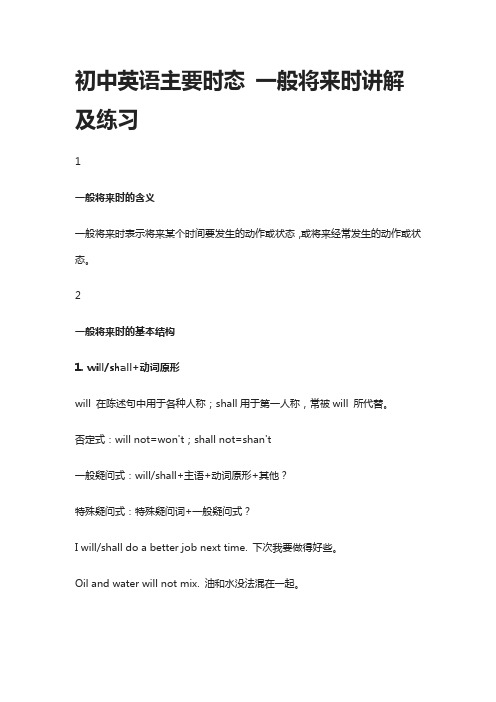
初中英语主要时态一般将来时讲解及练习1一般将来时的含义一般将来时表示将来某个时间要发生的动作或状态,或将来经常发生的动作或状态。
2一般将来时的基本结构1. will/shall+动词原形will 在陈述句中用于各种人称;shall用于第一人称,常被will 所代替。
否定式:will not=won't;shall not=shan't一般疑问式:will/shall+主语+动词原形+其他?特殊疑问式:特殊疑问词+一般疑问式?I will/shall do a better job next time. 下次我要做得好些。
Oil and water will not mix. 油和水没法混在一起。
—Will he help you with your English tonight? 今天晚上他会帮助你学习英语吗?—Yes, he will./No, he won't. 是的,他会。
/不,他不会。
—When will you arrive for America? 你什么时候去美国?—Tomorrow. 明天。
2. am/is/are going to +动词原形否定式:am/is/are not going to +动词原形一般疑问式:am/is/are +主语+ going to + 动词原形+其他?特殊疑问式:特殊疑问词+一般疑问式?He is going to spend his holidays in London. 他打算在伦敦度假。
Look at the dark clouds. There is going to be a storm. 看那乌云,快要下雨了。
Is he going to collect any data for us? 他会帮我们收集数据吗?What are you going to do tomorrow? 明天你打算作什么?3一般将来时的用法will+动词原形与am/is/are going to +动词原形的用法虽然都表示将来发生动作或情况,一般情况下能互换。
英语中一般将来时的总结与练习题

英语中一般将来时的总结与练习题一、一般将来时的总结1. 一般将来时的定义一般将来时表示将来某个时间要发生的动作或存在的状态,也常用于表示将来一段时间内的经常性动作或状态。
在英语中,一般将来时主要由助动词“will”或“shall”(第一人称)加动词原形构成。
此外,“be going to + 动词原形”也可表示将来时,常用于根据目前已知的情况预测未来即将发生的动作或状态。
2. 一般将来时的常见形式•“will + 动词原形”•“shall + 动词原形”(第一人称)•“be going to + 动词原形”•“be to do”结构(表示按计划或安排即将发生的动作)•“be about to + 动词原形”(表示即将发生的动作,不能与表示将来的时间状语连用)3. 一般将来时的用法•表示将来的动作或状态,通常与表示将来的时间状语连用,如“tomorrow”, “next year”, “in the future”等。
•表示根据现有情况推测未来可能发生的动作或状态,常用于“be going to”结构中。
•表示计划、安排或打算做的事情,常与“be to do”结构连用。
4. 与其他时态的区别•与现在进行时区别:现在进行时表示正在进行的动作,而一般将来时表示将来某个时间要发生的动作。
•与现在完成时区别:现在完成时表示过去发生的动作对现在造成的影响或结果,而一般将来时则表示未来即将发生的动作。
二、一般将来时的练习题1. 选择题(1) —_____ you _____ a party next weekend?—Yes, we will.A. Will; haveB. Are; havingC. Do; haveD. Are; go to have(2) They _____ a meeting this afternoon.A. are havingB. are going to haveC. will havingD. will have(3) —_____ you _____ your homework before you watch TV?—Yes, I _____.A. Will; do; willB. Are; doing; amC. Are; going to do; amD. Will; do; am2. 填空题(1) I _____ (meet) my friend at the airport tomorrow.(2) They _____ (not go) to the zoo if it rains.(3) We _____ (have) a picnic next Sunday. Will you join us?3. 翻译题(1) 明天我要去看望我的祖父母。
初中英语一般将来时语法讲解

初中英语一般将来时语法讲解(名师剖析必考英语语法知识点,建议下载打印练习)一般将来时考点归纳【考点1】一般将来时的标志一般将来时常用时间状语例题:(2016重庆B卷)I _____ Chinese dishes for my foreign friends tomorrow evening.A. will cookB. have cookedC. cookD. cooked答案:A【考点2】一般将来时的结构1. will /shall +动词原形【注:在书面语中,主语是第一人称时,常用shall ,在口语中,所有人称都可以用will;且will 常简略为'll,如:I'll,he'll等】例题1:Her brother will watch a basketball game this evening.变否定句:_______________________________________________________变疑问句:_______________________________________________________肯定回答:___________________ 否定回答:_________________________例题2:I will perform ballet at the party tomorrow.变否定句:_______________________________________________________变疑问句:_______________________________________________________肯定回答:___________________ 否定回答:_________________________例题3:They will buy a new car next year ?(划线提问) _____ _____ they _____ next year?例题4:I will stay in China for two days ? (划线提问) _____ _____ _____you _____in China? 例题5:(2016广西玉林、防城港、崇左)---How long _____ you _____ Little Women ?---I am due to return it in two weeks.A. have; borrowedB. will; lendC. will; keepD. have; got答案:1. Her brother won’t watch a basketball game this evening.Will her brother watch a basketball game this evening?Yes, he will.No, he won’t.2. I won’t perform ballet at the party tomorrow.Will you perform ballet at the party tomorrow?Yes, I will.No, I won’t.3. What; will; buy4. How long will; stay5. C2.be going to +动词原形【注:be随着主语的变化有人称和数的变化】例题1:They are going to have a party this weekend.变否定句:_______________________________________________________变疑问句:_______________________________________________________肯定回答:___________________ 否定回答:_________________________划线提问:_______________________________________________________例题2:There (将有一场校运会) next month.例题3:(2016甘肃张掖)We ______ have a picnic together with our teachers next Thursday.A. are goingB. are going toC. will goingD. may going to答案:1. They aren’t going to have a party this weekend.Are they going to have a party this weekend?Yes, they are.No, they aren’t.2. is going to be a sports meeting3. B3. 现在进行时表将来例题:(2016辽宁沈阳)I think it is true that Jill _____ to work today because she is on a trip.A. has comeB. didn’t comeC. is comingD. will not come答案:C4. 一般现在时表将来例题1:(2016黑龙江齐齐哈尔)I wonder if she _____ me when _____.A. calls; she arrivesB. will call; she arrivesC. calls; she will arrive例题2:(2016湖北咸宁)---I don’t know if it _________tomorrow.---Well, if it __________, the school sports meet will be canceled.A. will rain; will rainB. rains; will rainC. will rain; rainsD. rains; rains 例题3:(2016湖南邵阳)We _____ for a picnic if it _____rain this Sunday.A. will go; doesn’tB. will go; won’t goC. go; doesn’t答案:BCA5. 其他表将来的结构【了解即可】【考点3】will和be going to 的异同点例题1:(2016山东临沂)---Did you call Jenny ?---Oh no, I forget. I ______her right away.A. calledB. have calledC. callD. will call例题2:(2016福建泉州)---Have you watched the movie Kung Fu Panda 3, Kelly ?---Not yet. I ______it with my classmates tonight.A. will watchB. was watchingC. have watched例题3:(2016贵州六盘水)There ______ a football game in our city next week.A. will haveB. will beC. is going to haveD. is going to be答案:DAD【考点4】一般将来时的易错点例题1:(2016河北)Just go down the road, and you _______ the library next to the bank.A. seeB. sawC. have seenD. will see例题2:(2016广西玉林、防城港、崇左)---Do you know ______ a wonderful football match and two basketball matcheson July 15th?---Yeah. I am going to watch them on that day.A. there will beB. there will haveC. there areD. there have例题3:(2016甘肃武威)We ______ have a picnic together with our teachers next Thursday.A. are goingB. are going toC. will goingD. may going to答案:DAB基础演练教学建议:建议此部分用作当堂检测练习,复习完一般将来时时的相关考点以后,即刻让学生完成一般将来时的综合练习。
【英语】一般将来时知识点梳理及经典练习(超详细)(1)

【英语】一般将来时知识点梳理及经典练习(超详细)(1)一、一般将来时1.We____ shopping unless it ____ tomorrow.A. will go, will rainB. go, will rainC. will go, rainsD. go, rains【答案】C【解析】【分析】句意:除非明天下雨,否则我们将会去购物。
unless 除非,引导条件状语从句,从句中应该用一般现在时表示将来,主句用一般将来时。
故应选C。
【点评】考查动词时态。
2.—Do you know when Mrs. White for dinner this evening?—No, but I think she when she is free.A. will come; will comeB. will come; comesC. comes; will come【答案】 A【解析】【分析】句意:——你知道怀特太太今晚是否来吃晚饭吗?——不知道。
但我认为如果她有空,她会来。
空一,句子为含有宾语从句的主从复合句,主句是一般现在时,从句用它所需要的任何时态,根据this evening今晚,可知句子为一般将来时,will come;空二,回答是when引导的时间状语从句,从句是一般现在时,主句应用将来时,will come,故选A。
【点评】此题考查从句的时态。
3.Look on the bright side of life,and imagine that you ______ a happy and successful future.A. hadB. will haveC. haveD. have had【答案】 B【解析】【分析】考查时态.句意"看看生活中美好的一面,想象你会有一个幸福和成功的未来.".A过去时.B一般将来时态.C动词原形.D现在完成时态.结合语境"看看生活中美好的一面,想象你___一个幸福和成功的未来.",由future未来,可知,表示将来,用一般将来时态.答案是B.4.— There ________a football match on TV tonight. I can't wait to watch it.— Me, too. It's ________ Guangzhou Evergrande and the Australian team Melbourne Victory.A. will be; betweenB. will be; bothC. will have; betweenD. will have; both【答案】A【解析】【分析】句意为:---今晚将有一场电视直播足球比赛,我非常想看。
- 1、下载文档前请自行甄别文档内容的完整性,平台不提供额外的编辑、内容补充、找答案等附加服务。
- 2、"仅部分预览"的文档,不可在线预览部分如存在完整性等问题,可反馈申请退款(可完整预览的文档不适用该条件!)。
- 3、如文档侵犯您的权益,请联系客服反馈,我们会尽快为您处理(人工客服工作时间:9:00-18:30)。
七年级英语一般将来时语法知识点讲解及练习一、概念:表示将要发生的动作或存在的状态时间状语:tonight , in the future,tomorrow, next day(week, month, year),so on,the day after tomorrow(后天),in+段时间(在...之后)等。
二、基本结构:①主语+be going to + do;②主语+will+ do.③主语(只能为I /We)+shall+do三、否定句:在①be动词(am, is, are)后加not;②will后加not成won't;例如:I'm going to have a picnic this afternoon.I'm not going to have a picnic this afternoon.I will have a picnic this afternoon.I won 'have a picnic this afternoon.四、一般疑问句:be或will或shall提到句首,some改为any, and改为or,第一二人称互换。
例如:We are going to go for a walk this weekend.Are you going to go for a walk this weekend?We will go for a walk this weekend.Will you go for a walk this weekend?五、对划线部分提问。
一般情况,一般将来时的对划线部分有三种情况。
1.问人。
Who 例如:I' m going to go to New York soon.Who ' s going to go to New York soon.2.问干什么。
What , do.例如:My father is going to watch a match with me this afternoon.What is your father going to do with you this afternoon?My father will watch a match with me this afternoon.What will your father do with you this afternoon?3.问什么时候。
When.例如:She's going to go to bed at nine. When is she going to go to bed?She will go to bed at nine. When will she go to bed?六、同义句:be going to = willI am going to go swimming tomorrow. = I will go swimming tomorrow.七、be going to和will的区别be going to和will的用法虽然都表示将来发生动作或情况,但用法是有区别的。
(1)be going to 主要用于:1、表示事先经过考虑、安排好打算、计划要做的事情。
E.g. What are you going to do today?今天你们打算做什么?Dad and I are going to watch an opera this afternoon.今天下午我和爸爸打算去看歌剧。
I' m going to play the violin. 我打算拉小提琴。
She' s going to play the piano.她打算弹钢琴。
2、表示根据目前某种迹象判断,某事非常有可能发生。
E.g. Look! There come the dark clouds. It is going to rain. 瞧!乌云密集,天要下雨。
I am afraid I am going to have a cold. 恐怕我要患重感冒。
(2)will主要用于在以下几个方面:1、表示单纯的未来“将要”通用willeg: They will go to visit the factory tomorrow.明天他们将去工厂参观。
I'll come with Wang Bing, Liu Tao and Yang Ling.我将和王兵、刘涛、杨玲一起来。
2、表示不以人的意志为转移的自然发展的未来的事。
eg: Today is Saturday. Tomorrow will be Sunday.今天是星期六。
明天是(将)是星期日。
He will be thirty years old this time next year.明年这个时候他就(将)三十岁。
3、问对方是否愿意做某事或表示客气地邀请或命令。
eg: Will you please turn on the radio?请打开收音机好吗?八、一般将来时特殊用法:要注意"主将从现”这一语法现象:重要连词有:if (如果),as soon as(一....就...),when(当…时候),before, after, until(直到not…until 直到…才),unless(=not...if 除非)...If it rains, we won't have a picnic next week.I 'll tell you the news as soon as you come back.九、练习:(一)、填空(用be going to 填空)。
1.我打算明天和朋友去野炊。
I ________ have a picnic with my friends.2.下个星期一你打算去干嘛?我想去打篮球。
What ___________________ next Monday?I _______ ________ __________ play basketball.3.你妈妈这个周末去购物吗?是,她要去买一些水果。
________ your mother__________go shopping this____________?Yes, she ___________. She _________________ buy some fruit.4.你们打算什么时候见面?What time _______ you_________meet?(二)用所给词的适当形式填空。
11.Today is a sunny day. We___________ (have) a picnic this afternoon.12.My brother_______________ (go) to Shanghai next week.13.Tom often_______________ (go) to school on foot. But today is raining ,he _______________ (go) to school by bike.14.What do you usually do at weekends?I usually____________ (watch) TV and____________ (catch) in sects15.It ' s Friday today. What she _____________ (do) this weekend?16.What____________ (do) you do on Sun days? I_________ (pick) apples on a farm.17.Mary_______________ (visit) her grandparents tomorrow.19.David_______________ (give) a painting show next Mon day.20.There_______________ (not be)a football match next month.21.We_______________ (buy) him a pen for his birthday next week.22.I_______________ (call)you when I get there.23.If it______ (be) sunny tomorrow, we____________ (have)a picnic outside.24.I_______________(tell)him the news when I see him at the office.25. Where__________Tom__________ (go) the day after tomorrow?现在进行时一、现在进行时的用法。
1. 正在发生I am reading a book. 我正在读书。
2. 即将发生He is dying.他快死了。
3. 逐渐The leaves are turning yellow.叶子在逐渐变黄。
标志词:now 现在Listen 听Look 看二、现在进行时的结构。
主语+be+现在分词(ing)b e动词和现在分词缺一不可三、动词变现在分词的规则。
1. 直接+ing walk-walking2. 以不发音的e结尾的动词,去e加ing make-making3. 以重读闭音节结尾的动词,双写最后一个字母加ingcut-cutting切swim-swimming 游泳put-putting放shop-shopping 购物get-getting得到stop-stopping 停sit-sitting 坐begin-beg inning 开始win-winning赢forget-forgetting 忘记run-running 跑4. 少数以ie结尾的单词,把ie变y加ing die-dying死lie-lying躺He is dying.他快死了。
I am lying on the bed.我正躺在床上。
四、现在进行时的句子结构及变化。
肯定句:主语+be+现在分词+... 否定句:主语+be+not+现在分词+...一般疑问句:Be+主语+现在分词+...?肯定回答:Yes,主语+be. 否定回答:No,主语+be+not.用所给的动词的正确形式填空。
1.The boy ______________(draw) a picture now.2.I ______________(read) English now.3.He ______________(go) to the park now.4.My mother ______________(cook) some n ice food now.5.They ______________(not ,water) the flowers now.6.We ______________(have) supper now.7.My mother ______________(clean) the room now.8.What_________you____________( do ) now?9.Listen! Some girls ______________(sing) in the classroom.10.Look! They ______________ (have) an English less on.11.Look! The girls ______________ (dance) in the classroom.12.What is our grandmother doing? She_____________(listen)to music.13. _________Helen___________(wash)clothes? Yes,she is.14. We ______________(have) an English class.15. What______they_______(do) ? They_________(sit) in the park.选择。
